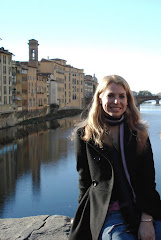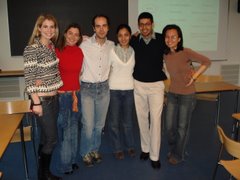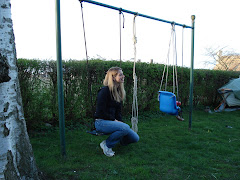You see it described in their Facebook profiles, and it's obvious when you visit any ‘house of worship’ Sunday morning. It’s organized and it's everywhere, and frankly, at times, it has me taking a step back.
The religion is called atheism, and it operates within a brand of fundamentalism. You can find many mainstream atheists - those who don’t sneer at others – who welcome conversation with persons of a different faith. But frankly, they don’t run in my circles.
On one of my 4 recent business trips to the U.S. in the last 5 weeks, my colleagues and I were seated on a flight next to a Danish missionary.
He was a real live one – a Christian something (not sure which denomination). This thin, 30-something man with a receding hairline, an overbite and pink gums that were
revealed every time he smiled (about every 5 seconds) was a real talker. Curiosity shone in his eyes when he learned we were from an advertising agency. “Heck, maybe he wanted our service in helping to brand God,” laughed a board-room full of colleagues a few weeks later.
This friendly missionary, who wanted little more than to hear about our work, elicited the scorn and fear of a group of educated, talented, self-professed open-minded adverts. ‘What a fool, that man.’ Clearly he didn’t get the memo that people in the Kingdom choose intellect over naiveté. And those who do not, apparently haven’t got the smarts to know better.
This sweet man, and all of our chatter, broke my heart.

Many will huff that they have no problem with religion or spiritual persons– “just as long as they keep me out of it, and respect that I believe it’s a crock of shit” .... while not appreciating that such proactive haughtiness can be just as off-putting as any proselytizing sermon from a stranger.
Organized religion is one of those grand narratives like the Enlightenment, the Renaissance, liberalism, conservatism, and Studio 54 that my knee-jerk reaction wants to reject. Wannabe postmodernist that I am. We tend to over-privelge meta-narratives at the expense of missing the smaller ones. Where pearls of wisdom and nuggets of nonsense reside. The poetics of postmodernism urge us to raise an eyebrow to grand narratives. But applying the inverse of that same logic, shouldn’t I look with equal suspicion on the grand rejection.
America is a spiritual nation, where Judeo-Christian values inform our lifestyles, our traditions and our modes of conduct. For better or for worse, it is ours to celebrate or denigrate, but thankfully, we have a well-constructed system that separates church and state, so that schools, government and the judicial system cannot infringe on an individual’s right to believe in whatever combination of deities they like, or not. A wise Danish thinker, Camelia, once told me that the interesting thing about America is that for every major movement that appears, so does its counter-movement. A concept like “intelligent design” gives me the willies, but most Americans don’t give it the attention it doesn’t deserve. For this naïve American, Copenhagen tends to feel like one big counter-movement, that has forgotten what it runs perpendicular to. What was once fringe-full and progressive has become fundamental and common. A bit monochromatic, I long for some bible thumping, some Hora wedding dancing, some sweaty “1-800-send-me-your-cash” preachers, and conversations somewhere in the middle, where the faithful person isn’t labeled weak or a dunce.
In the American paradigm, it’s easier for me to fight for the little guy – the quiet dissenter or the non-believer. Perhaps he’s looking for someone to have brunch with on Sunday mornings. But there was a time I was perusing an admissions book from Harvard Divinity School, to see if a master’s degree in religious studies was something worth pursuing.
Like many, I’m still searching for answers, but I’m not smart, wise, or arrogant enough to commit to any yet.  It’s possible I was more interested in belonging to the Church of Harvard than any religious program.
It’s possible I was more interested in belonging to the Church of Harvard than any religious program.
 It’s possible I was more interested in belonging to the Church of Harvard than any religious program.
It’s possible I was more interested in belonging to the Church of Harvard than any religious program.
But I admire those who have found their own belief system. It would be rude to call it simplistic or any easy escape. I’m happy America is built the way it is.
.........................................
Last spring, a talented and shrewd Danish professor told me that he knew the minute I walked into his classroom that I was an American. I found that odd. How could he know? He elaborated, “There’s just something in the gaze of an American.”

His words have echoed over the last 19 months throughout my tenure in Denmark. I’ve grown adept at picking out Americans on the street. It’s easiest to spot when strolling down the long shopping street of the Strøget. My success rate is about 95%, and when in doubt, I shimmy past the group in question to hear them talking. It’s not just the white tennis shoes or the track-suits that no one else is wearing, and it's more than the obnoxiously higher volume of voice. It’s something in the gaze of an American.
Maybe it’s faith. In something higher and bigger. Maybe its faith in nothing. Whatever it is, it’s palpable, and it speaks to other humans.
Mostly, it's an attitude that says faith doesn’t necessarily transcend knowledge, but the two can co-exist. Intellectual rationalism is all well and good, but hampered by the capacities of our lowly functioning brains.
And on that note, I’ll suspend my ribbing of Denmark’s shabby chic atheism and try to understand it in the context of European nations who have seen bloodshed, the Holocaust, ethnic cleansing, the crusades, and much more, on their home turf, in the name of religion.
The process of belong to a beliefs system is something I’m ill-equipped discussing. But it deserves its rightful share of discussion without derision.
Likewise, so is disbelief. And that is another lesson Denmark is teaching me.
If you have any answers, you know how to reach me.

(Hermosa Beach, California - Sunday morning)












